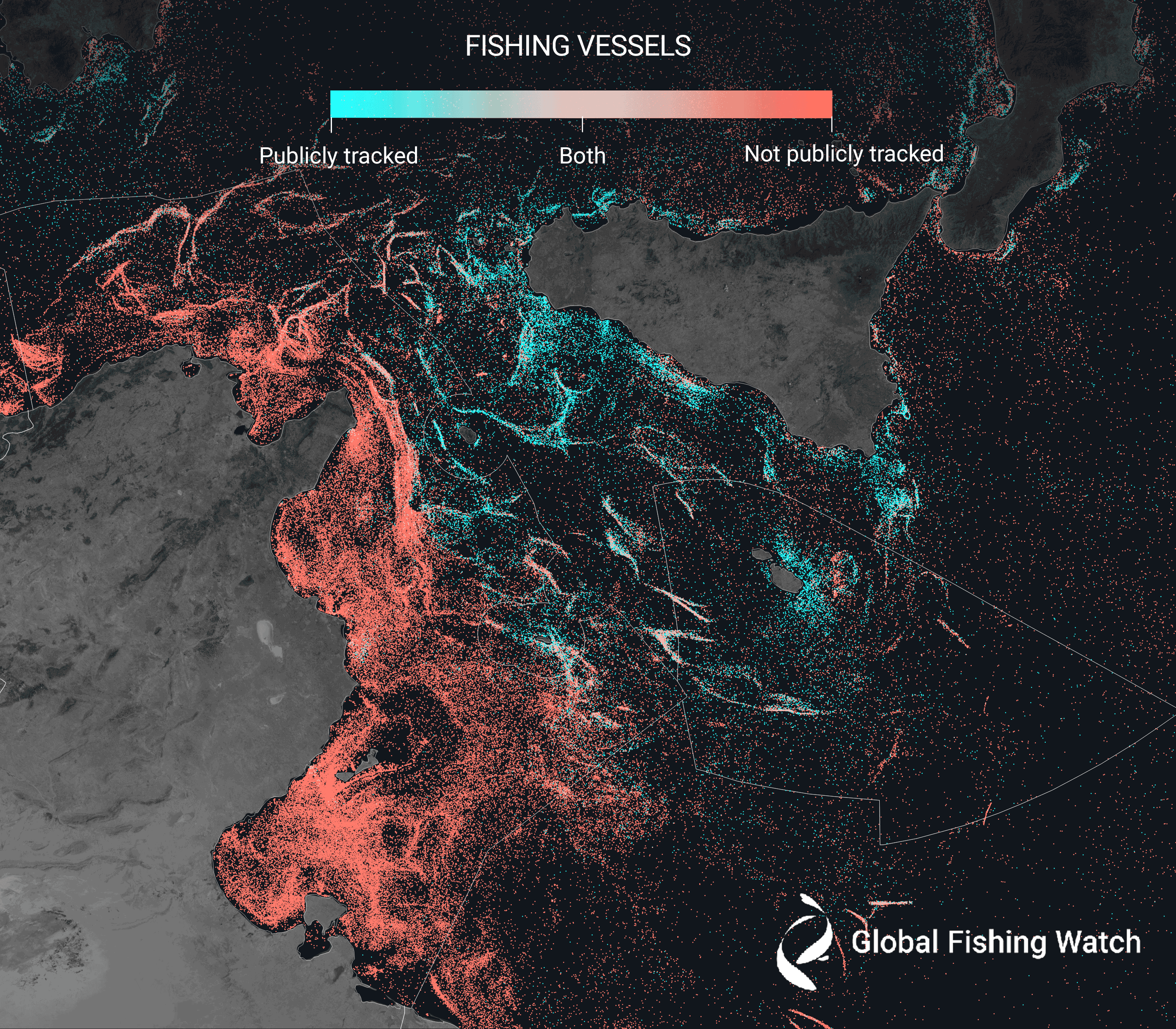Innovations
See the World Through the Eyes of Animals With These Stunning New Videos
By making ultraviolet light accessible to our eyes, a novel camera system reveals how insects, birds and other creatures experience color
ChatGPT Helped Write This Award-Winning Japanese Novel
After receiving the prestigious Akutagawa Prize, Rie Kudan spoke about why she used A.I. to write a portion of her work
NASA Finally Opens Canister Holding Asteroid Sample—See What They Found
It took several months for the researchers to remove two stuck fasteners, which required them to design new tools
These Satellite Maps Reveal Rampant Fishing by Untracked 'Dark Vessels' in the World's Oceans
Using satellite imagery and A.I., a new study finds about 75 percent of industrial fishing is not publicly tracked, and clandestine ships enter marine protected areas
Engineers Design a Vibrating Pill for Weight Loss That Could Create a Feeling of Fullness
The capsule is the size of a multivitamin, and in an experiment with pigs, it appeared to reduce the animals' appetites
Could A.I. Help Seismologists Predict Major Earthquakes?
The 7.5 magnitude quake in Japan highlights the need for earthquake prediction, a science shedding its "unserious" reputation and inching toward reality
Seven Scientific Discoveries From 2023 That Could Lead to New Inventions
Biologists learned lots about animals and plants this year, and their findings could inspire better robots, medicine and environmental technologies
When a Labyrinth of Pneumatic Tubes Shuttled Mail Beneath the Streets of New York City
Powered by compressed air, the system transported millions of letters between 1897 and 1953
Lillian Vernon’s Catalog Empire Got Its Start at a Kitchen Table
A keen sense of what shoppers wanted made her eponymous company the first woman-owned business on the American Stock Exchange
'Hallucinate' Is Dictionary.com's Word of the Year for 2023
In the context of artificial intelligence, the word means "to produce false information" and "present it as if true"
Tiny 'Robots' Made From Human Cells Show Wound-Healing Potential
The so-called "anthrobots" can self-assemble and move on their own, and they prompted damaged neurons to regenerate in a recent study
Could a 550-Mile Pipeline From the Ocean Save the Great Salt Lake? Scientists Say Probably Not
New research suggests the electricity costs would exceed $300 million per year and carbon dioxide emissions could approach one million metric tons annually
Kiss Debuts Digital Avatars That Will Keep the Band 'Forever Young and Forever Iconic'
The rock band is the first in the U.S. to immortalize its performances with a digital recreation
DNA Pulled From Paw Prints May Help Researchers Study Elusive Polar Bears
As rising temperatures threaten the Arctic mammals, scientists are turning to new, non-invasive methods to study them
Here's What We Know About Neanderthals So Far
Today, thanks to new artifacts and technologies, findings about our closest relatives are coming thick and fast
Brain Implants Show Promise for People With Traumatic Brain Injuries in Small Study
Electrodes placed in the brains of five patients led to "profound" improvements in cognitive function, even years after their injuries
A New Drug That Could Extend Dogs' Lives Inches Closer to Approval
For the first time, the FDA has indicated a willingness to endorse a longevity drug
This High-Tech Shirt Helps Deaf and Hard-of-Hearing Patrons Feel Music
Guests at Chicago's Lyric Opera can now immerse themselves in performances through the SoundShirt’s vibrations
Could Wooden Satellites Reduce Space Junk? The First Is Set to Launch Next Year
NASA and Japan plan to test a biodegradable satellite made of wood, which burns up more easily than metal on reentry
A Robotic 'A.I. Chemist' Could Make Oxygen on Mars
In a lab on Earth, the machine created a catalyst from Martian materials that can extract oxygen from water, for astronauts to breathe or use as fuel
Page 1 of 27
:focal(730x414:731x415)/https://tf-cmsv2-smithsonianmag-media.s3.amazonaws.com/filer_public/44/8d/448dc0c2-807c-42f8-921e-e4176af4ac27/screenshot_2024-01-25_at_14546_pm.png)
:focal(640x482:641x483)/https://tf-cmsv2-smithsonianmag-media.s3.amazonaws.com/filer_public/ed/3f/ed3f3205-2947-4a9e-b438-cf9f5ed98f07/gettyimages-1611741811.jpeg)
:focal(960x722:961x723)/https://tf-cmsv2-smithsonianmag-media.s3.amazonaws.com/filer_public/f1/b7/f1b793c1-9ead-42b5-8977-4a962d516221/jsc2024e006057large.jpg)

:focal(450x300:451x301)/https://tf-cmsv2-smithsonianmag-media.s3.amazonaws.com/filer_public/b9/31/b9315b10-032c-465f-97de-e4073bfe1906/mit_obesity-treatment-02-press.jpg)
:focal(1792x1195:1793x1196)/https://tf-cmsv2-smithsonianmag-media.s3.amazonaws.com/filer_public/63/f3/63f3c86f-7658-46f8-9156-6f2f2c5c2fec/gettyimages-1893315593.jpg)
:focal(960x649:961x650)/https://tf-cmsv2-smithsonianmag-media.s3.amazonaws.com/filer_public/52/0c/520c1e9a-9a4e-4182-a0e6-2530427f0848/monarch-butterfly.jpg)
:focal(700x507:701x508)/https://tf-cmsv2-smithsonianmag-media.s3.amazonaws.com/filer_public/27/b4/27b41115-109e-45df-869d-45f64d58962e/pneumatic-tube.jpg)
:focal(1500x1129:1501x1130)/https://tf-cmsv2-smithsonianmag-media.s3.amazonaws.com/filer_public/5f/42/5f428475-c1b7-4da0-99be-63dcf0b32134/kitchen-table-jn2020-00216.jpg)
:focal(1750x1167:1751x1168)/https://tf-cmsv2-smithsonianmag-media.s3.amazonaws.com/filer_public/f9/2c/f92c9d1b-4f91-4aa1-ab6c-4e310fbc471d/pexels-pixabay-267669.jpg)
:focal(555x523:556x524)/https://tf-cmsv2-smithsonianmag-media.s3.amazonaws.com/filer_public/e0/c5/e0c570cd-473f-4748-83e9-20c35437129b/anthrobot_with_cilia_02.jpg)
:focal(400x267:401x268)/https://tf-cmsv2-smithsonianmag-media.s3.amazonaws.com/filer_public/ba/64/ba64dfa3-33f5-40dc-85d0-f2223f0b2942/gettyimages-1332144553_1.jpeg)
:focal(2000x1295:2001x1296)/https://tf-cmsv2-smithsonianmag-media.s3.amazonaws.com/filer_public/63/f1/63f1c037-a295-48e9-9a6c-9d99905bb474/gettyimages-1827867959.jpg)
:focal(1000x671:1001x672)/https://tf-cmsv2-smithsonianmag-media.s3.amazonaws.com/filer_public/81/de/81dea282-dec0-4c63-93ac-bf1872179d5f/natdiglib_34179_extralarge.jpg)
:focal(800x602:801x603)/https://tf-cmsv2-smithsonianmag-media.s3.amazonaws.com/filer_public/1a/3f/1a3f8bfd-6bb5-4c3b-9cad-0186bd75439c/1_neanderthal-museum-cc_web.jpg)
:focal(400x229:401x230)/https://tf-cmsv2-smithsonianmag-media.s3.amazonaws.com/filer_public/5c/f9/5cf9b986-b03c-4983-a6e9-12c4640b0622/gettyimages-1607068544.jpeg)
:focal(1061x707:1062x708)/https://tf-cmsv2-smithsonianmag-media.s3.amazonaws.com/filer_public/02/43/024336e0-bdf4-44f3-ac35-238102b81df2/gettyimages-1317511160.jpg)
:focal(2016x1517:2017x1518)/https://tf-cmsv2-smithsonianmag-media.s3.amazonaws.com/filer_public/63/6f/636f31b3-c50b-49bf-b2c1-cf172463f5ad/soundshirt.jpeg)
:focal(400x267:401x268)/https://tf-cmsv2-smithsonianmag-media.s3.amazonaws.com/filer_public/6a/53/6a53ca5e-436e-4aae-91fc-2ffdb3bd420d/img_interview_murata_03_1.jpg)
:focal(1696x1437:1697x1438)/https://tf-cmsv2-smithsonianmag-media.s3.amazonaws.com/filer_public/30/b2/30b24621-d8c1-49d8-9fce-ddb1528a271e/gettyimages-3067727.jpg)